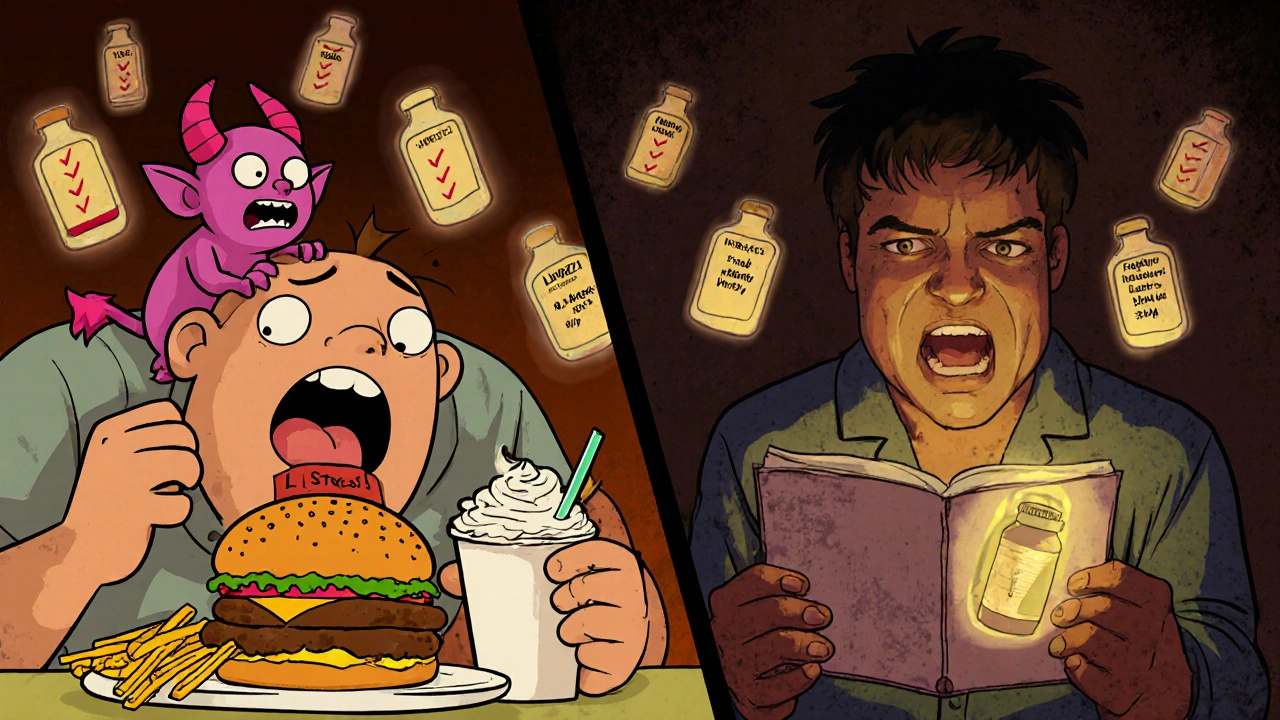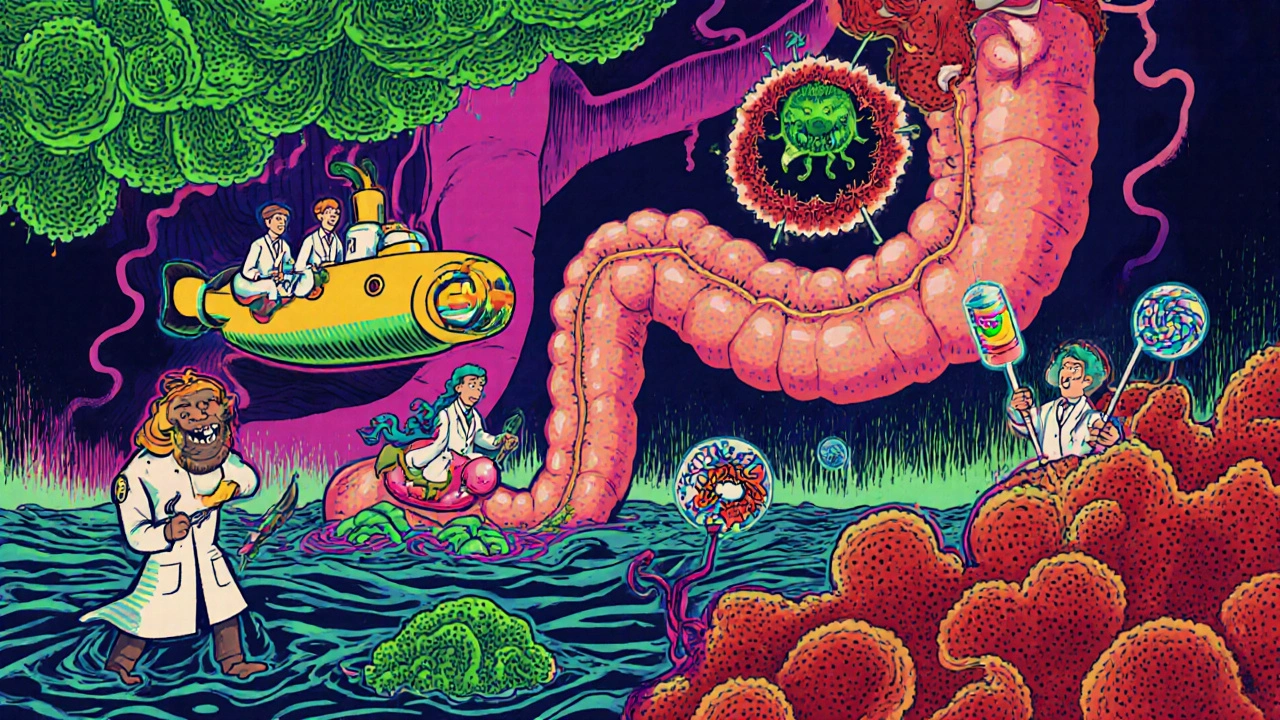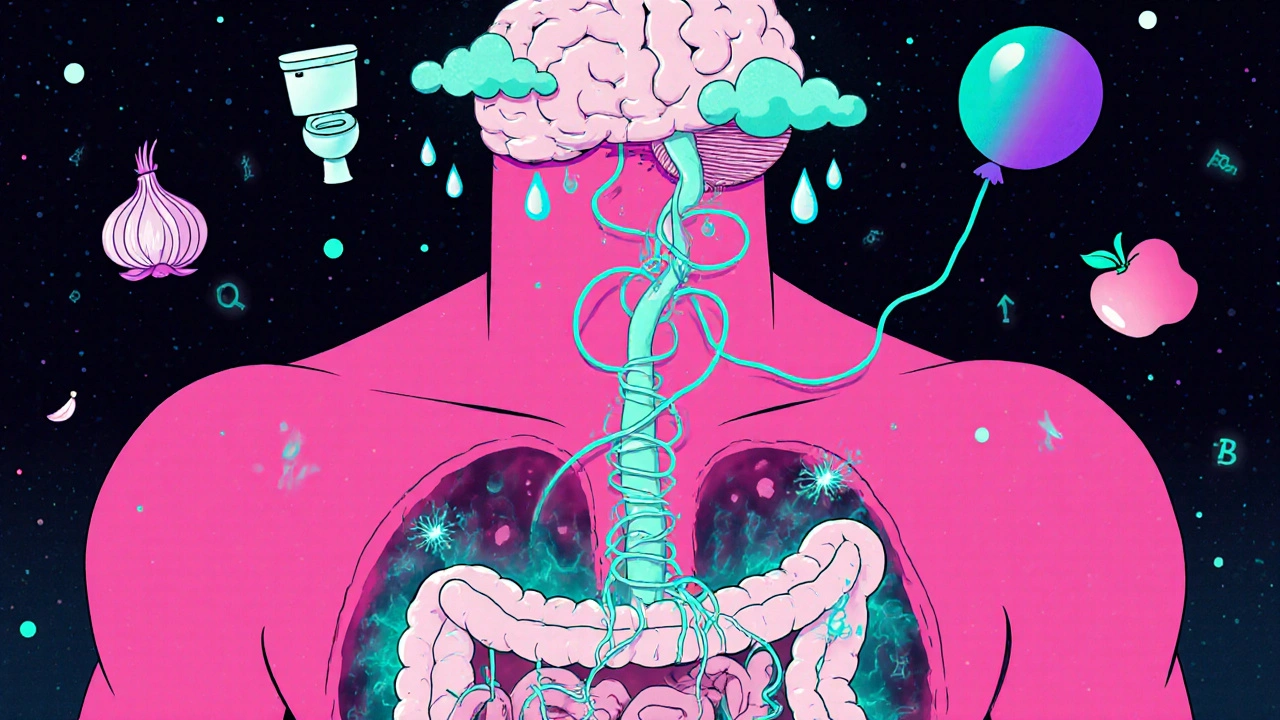Irritable Bowel Syndrome isn’t just occasional stomach upset. It’s a persistent, often disabling condition that affects 10 to 15% of people worldwide. If you’ve been dealing with cramps, bloating, diarrhea, or constipation that keeps coming back - and doctors keep saying there’s nothing “wrong” with your tests - you might be dealing with IBS. Unlike Crohn’s or ulcerative colitis, IBS doesn’t show up on scans or blood tests. But that doesn’t make it any less real. The pain is real. The discomfort is real. And yes, there are ways to manage it - if you know where to look.
What IBS Actually Feels Like
People with IBS don’t just have “a sensitive stomach.” Their symptoms follow a clear pattern. The pain usually happens after eating and gets better after a bowel movement. It’s often described as cramping, sharp, or a deep ache in the lower belly. Bloating is common too - not just gas, but a swollen, tight feeling that makes clothes feel too tight. Some days, you’re stuck on the toilet with watery stools. Other days, you’re straining for hours with hard, pebble-like stools. Many people report feeling like they haven’t fully emptied their bowels, even after going. Around 40% of people with IBS fall into the diarrhea-predominant type (IBS-D). About 35% have constipation-predominant (IBS-C), and the rest switch back and forth (IBS-M). Mucus in stool is common. So is excessive gas. And while it’s not always talked about, many people also deal with nausea, heartburn, or even chest pain that feels like a heart issue - but isn’t. These symptoms don’t show up randomly. They’re tied to your gut-brain connection. Stress can turn mild discomfort into a full-blown flare-up. That’s why IBS isn’t “all in your head” - it’s in your gut, and your brain, and how they talk to each other.What Makes Symptoms Worse
You can’t fix IBS by just popping pills. Triggers matter. And they’re different for everyone. But some patterns show up again and again. Foods high in FODMAPs - fermentable carbs like onions, garlic, wheat, dairy, apples, and artificial sweeteners - trigger symptoms in about 70% of people. That’s why the low-FODMAP diet works for so many. It’s not a forever diet. It’s a tool to figure out what’s bothering you. After 2 to 6 weeks of cutting them out, you slowly add them back in one at a time to find your personal triggers. Caffeine, alcohol, spicy foods, and fatty meals are also common offenders. Even if you don’t think you’re sensitive, try cutting them out for a month. You might be surprised. Stress is another big one. About 60 to 80% of people notice their symptoms spike during stressful times - job pressure, family drama, even a bad night’s sleep. It’s not weakness. It’s biology. Your gut has its own nervous system, and it reacts to emotional stress like a mirror. Hormones play a role too. Around 60 to 70% of women with IBS report worse symptoms right before or during their period. That’s because estrogen and progesterone affect gut motility. Antibiotics can also trigger IBS. About 1 in 4 people develop symptoms after taking them. That’s because antibiotics wipe out good bacteria along with bad ones, throwing your gut microbiome out of balance.How Doctors Diagnose IBS
There’s no single test for IBS. Diagnosis is based on symptoms - specifically, the Rome IV criteria. That means: abdominal pain at least once a week for the last three months, with two of these three features: pain linked to bowel movements, change in stool frequency, or change in stool appearance. But first, your doctor has to rule out other things. That’s why you might get blood tests, stool tests, or even a colonoscopy. They’re checking for celiac disease, inflammatory bowel disease, infections, or colon cancer. Red flags that need immediate attention? Weight loss without trying, rectal bleeding, anemia (especially if your hemoglobin is below 12 g/dL for women or 13 g/dL for men), symptoms starting after age 50, or a family history of colon cancer or IBD. If any of these are present, more testing is needed. Most people see their doctor 2 to 3 times over 4 to 8 weeks before getting a clear diagnosis. That’s frustrating, but it’s necessary. IBS is a diagnosis of exclusion - meaning, it’s what’s left after other causes are ruled out.
Medications That Actually Work
There’s no cure for IBS. But there are medications that can help you feel like yourself again. For IBS-D (diarrhea): Eluxadoline (Viberzi) and rifaximin (Xifaxan) are FDA-approved. Eluxadoline reduces both pain and diarrhea in about half of users. Rifaximin, an antibiotic that stays in the gut, helps by calming overactive bacteria. Both take a few weeks to show full effect. Over-the-counter loperamide (Imodium) helps with diarrhea but doesn’t touch the pain or bloating. It’s a quick fix, not a solution. For IBS-C (constipation): Linaclotide (Linzess) and plecanatide (Trulance) work by increasing fluid in the intestines. About 30 to 40% of users get at least three full bowel movements a week. Lubiprostone (Amitiza) does something similar and works for about 25 to 30% of people. For pain and cramping: Antispasmodics like dicyclomine (Bentyl) or hyoscyamine (Levsin) relax the gut muscles. They help about 55% of people, but can cause dry mouth or dizziness. For overall symptom control: Low-dose tricyclic antidepressants like amitriptyline (10-30 mg at night) are surprisingly effective. Not because you’re depressed - because they calm the nerves in your gut. About 40 to 50% of users report better pain and bloating after 4 to 8 weeks. Probiotics? Only one strain has solid proof: Bifidobacterium infantis 35624. It improved symptoms in 35% of people in trials. Most other probiotics? Not proven.Non-Medication Treatments That Work
Medications aren’t the only option - and sometimes, they’re not the best first step. The low-FODMAP diet, guided by a registered dietitian, helps 50 to 75% of people. It’s not easy. It’s strict at first. But once you know your triggers, you can eat normally again - just avoiding your personal troublemakers. Cognitive behavioral therapy (CBT) and gut-directed hypnotherapy are just as effective as pills for many. In studies, 40 to 60% of people saw major symptom improvement. These therapies teach your brain to stop overreacting to gut signals. It’s like retraining your nervous system. Exercise helps. Not because it “moves things along,” but because it reduces stress hormones and improves gut motility. Even 30 minutes of walking a day makes a difference. Sleep matters. Poor sleep worsens pain sensitivity and gut function. Aim for 7 to 8 hours. Keep a consistent schedule.
What to Expect Over Time
IBS doesn’t go away. But it doesn’t have to control your life. Most people who stick with a personalized plan - diet, stress management, and the right meds - see big improvements in 4 to 6 months. About 60 to 70% of patients report much better quality of life. It’s not about perfection. It’s about control. You’ll still have bad days. But you’ll know why. You’ll know how to handle them. And you won’t be afraid to leave the house. The average person waits over six years to get diagnosed. That’s too long. If your symptoms match IBS, don’t wait. Start tracking your food, stress, and bowel habits. Talk to your doctor. Ask about the low-FODMAP diet. Ask about gut-directed therapy. Ask about meds that target your specific subtype. You’re not broken. You’re not imagining it. And you’re not alone.What’s Next for IBS Treatment
Research is moving fast. In 2023, the FDA gave breakthrough status to a new drug called ibodutant, which targets nerve signals in the gut. Early results show it improves symptoms in 45% of users - nearly double the placebo rate. Fecal microbiota transplants (FMT), where healthy gut bacteria are transferred from a donor, are being tested. One study found 35% of IBS patients went into remission after FMT, compared to just 15% in the control group. Scientists are now looking at distinct microbial fingerprints in IBS-D versus IBS-C. That could lead to personalized probiotics or even microbiome-based diagnostics. None of this is available yet. But it shows the future is moving beyond just “avoid triggers and take a pill.” We’re getting closer to treatments that fix the root problem - not just mask the symptoms.Can IBS turn into Crohn’s disease or colon cancer?
No. IBS is a functional disorder, not a structural one. It doesn’t cause inflammation, damage the intestinal lining, or increase cancer risk. But some symptoms overlap with IBD or colon cancer. That’s why doctors test to rule those out - especially if you have red flags like weight loss, bleeding, or symptoms starting after age 50.
Is the low-FODMAP diet hard to follow?
Yes, at first. It eliminates many common foods like bread, onions, garlic, apples, and dairy. But it’s not meant to be permanent. It’s a 3-phase process: eliminate, reintroduce, personalize. Most people work with a dietitian and find their triggers within 10 to 14 weeks. After that, they can eat a wide variety of foods - just not the ones that bother them.
Do probiotics help with IBS?
Most don’t. Only one strain, Bifidobacterium infantis 35624, has strong evidence showing it helps global IBS symptoms in about 35% of users. Other probiotics may help some people, but the research is mixed. Don’t waste money on random brands. Look for this specific strain if you want to try one.
Can stress cause IBS?
Stress doesn’t cause IBS, but it makes it much worse. About 60 to 80% of people report flare-ups during stressful times. That’s because your gut and brain are wired together. Stress hormones change how your intestines move and sense pain. Managing stress through therapy, mindfulness, or exercise can reduce symptoms as much as medication.
How long does it take for IBS medication to work?
It depends. Loperamide works in hours. Linaclotide and eluxadoline usually show results in 2 to 4 weeks. Antidepressants like amitriptyline can take 4 to 8 weeks at full dose. Don’t quit too soon. Give each treatment at least a month before deciding if it works.


Comments
Patrick Goodall
November 24, 2025 AT 16:05So let me get this straight… Big Pharma doesn’t want us to know the REAL cause of IBS? 😏 It’s not food or stress-it’s the 5G towers messing with our gut microbiome! I’ve been tracking my symptoms since the rollout and guess what? Every time I go near a cell tower, I turn into a human toilet. 🚽💥 They’re covering it up because they make more money selling loperamide than fixing the root cause. I’ve got 17 spreadsheets to prove it. #FreeTheGut
Kaylee Crosby
November 25, 2025 AT 13:56I was diagnosed with IBS-C after 5 years of being told I was ‘just anxious’-and honestly? This post nailed it. The low-FODMAP diet changed my life. I didn’t believe it at first, but after cutting out garlic and onions for two weeks, I actually slept through the night. No more panic attacks before meetings. You’re not broken. You just need to listen to your body. 💪❤️
Mariam Kamish
November 26, 2025 AT 03:16Ugh. Another ‘IBS is real’ post. I’ve seen this 100 times. Everyone’s just too lazy to eat like a normal human. Stop blaming your diet and just eat less junk. Also, probiotics are a scam. 🤷♀️
Emma Hanna
November 26, 2025 AT 22:00It is deeply irresponsible to suggest that low-dose antidepressants are a legitimate treatment for IBS without emphasizing the potential for dependency, emotional blunting, and the fact that many patients are misdiagnosed as ‘psychosomatic’ when they have undiagnosed celiac disease. This is medical negligence dressed as advice. Please consult a gastroenterologist who doesn’t rely on Google. 🚫💊
Karen Ryan
November 27, 2025 AT 06:21As someone from a culture where gut health is tied to spiritual balance (I’m from the Philippines), I’ve seen my abuela use ginger tea, turmeric, and prayer to calm IBS flare-ups. It’s not just about food or meds-it’s about rhythm, rest, and reducing shame. I’ve tried everything. The thing that helped most? Letting go of guilt when I had a bad day. You’re not failing. You’re healing. 🌿🫶
Lawrence Zawahri
November 28, 2025 AT 19:22They don’t want you to know this, but IBS is caused by glyphosate in the food supply. The FDA knows. The WHO knows. But they won’t admit it because Monsanto owns half the medical journals. I’ve been eating organic for 3 years and my IBS-D vanished overnight. The ‘low-FODMAP diet’? A distraction. The real enemy is Roundup. Wake up. 🌱💣
Benjamin Gundermann
November 30, 2025 AT 01:44Man, I used to think I was just weird for needing to plan every outing around a bathroom. Then I found out my buddy’s cousin’s neighbor had the same thing. Turns out, IBS is just the body’s way of screaming ‘I’m overwhelmed!’-and nobody listens until you’re crying in a Target bathroom at 2 a.m. I started walking after dinner, cut out soda, and now I actually go on road trips. It’s not magic. It’s just… paying attention. You got this. 🤝
Dirk Bradley
December 1, 2025 AT 16:38While the article presents a superficially coherent overview of Irritable Bowel Syndrome, it conspicuously neglects to address the epistemological limitations of the Rome IV criteria, which are predicated upon subjective symptom reporting rather than objective biomarkers. Furthermore, the endorsement of pharmacological interventions such as linaclotide and amitriptyline-both of which carry significant anticholinergic and serotonergic side effects-without a rigorous cost-benefit analysis constitutes a troubling conflation of palliation with therapeutic efficacy. One must question the hegemony of biomedical reductionism in functional gastrointestinal disorders. 🧠📚